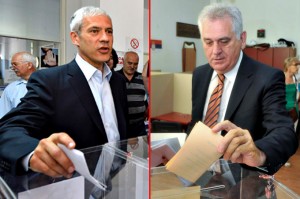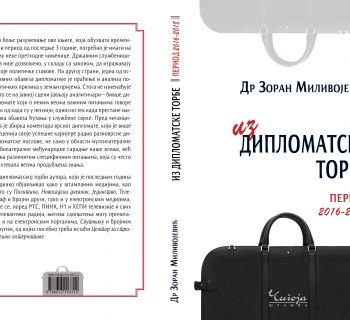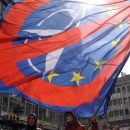Voters return to the polls on Sunday (May 20th) to decide who will serve as president for the next five years — former president Boris Tadic of the ruling Democratic Party or opposition Serbian Progressive Party leader Tomislav Nikolic.
 Tadic, who resigned last month in order to seek a new mandate, won the first round by a hair, with 25.31% of the votes, compared to Nikolic’s 25.05%.
Tadic, who resigned last month in order to seek a new mandate, won the first round by a hair, with 25.31% of the votes, compared to Nikolic’s 25.05%.
But what began as a calm couple of weeks between the two rounds has evolved into a bitter fight between the two candidates, especially after Nikolic accused authorities of organising major vote rigging — stealing votes — on a scale significant enough to dramatically alter the outcome of the first round on May 6th.
On May 10th, he showed reporters gathered outside the parliament building a bag full of ballots with his name circled, claiming they had been found in a waste container. In their place, he said, were false ballots, votes for Tadic. “I call on Boris Tadic to react to what we are presenting today, and what his party did directly under his control. Probably on his orders and with his approval too,” Nikolic said.
The OSCE, the Serbian Electoral Commission and the NGO Centre for Free Elections and Democracy, which monitored the elections, confirmed irregularities occurred, but not enough to have changed the outcome.
Centre for Free Elections and Democracy representative Marko Blagojevic told SETimes that “election abuse is possible,” but that it was “unusual for everyone to miss such big ballot theft” as the one alleged by Nikolic. He noted that Nikolic’s party had controllers at every polling station who voiced no major objections on election night.
Supporters mobilised, staging a series of protests, while Nikolic himself announced he might just drop his bid. He opted to stay in the race however and vowed to prevent any fraud in the run-off, adding he was ready “to physically defend each vote.”
In response, Tadic accused Nikolic of attempting to destabilise the state. “Everyone must be responsible for their own actions and for the citizens’ safety. I will not contribute to that in any way, and I call for peace. All institutions should do their job and check election results, while participants in elections should contribute to a good situation and atmosphere.”
Vladimir Radomirovic, with the Centre for Strategic Alternatives, believes that the best solution is a new vote count and punishing those responsible for the alleged ballot tampering.
“It is interesting that the Serbian Progressive Party was not the only one to talk about election theft. Some other parties also talked about suspicious results in the first days after the elections. They, however, abandoned potential complaints when they received guarantees [they'd be] in the new government that will most likely be formed by the Democrats,” Radomirovic told SETimes.
Ian Bancroft, founder of the organisation TransConflict, says all concerns related to the elections process must be resolved for the sake of the future government’s stability. “It is imperative that any allegations about election fraud are thoroughly investigated, and charges brought if necessary. The international community should add its voice to such calls,” Bancroft told SETimes.
Both agree that the accusations completely changed the course of the campaign. Nikolic’s success will hinge on his ability to convince voters “that there was indeed theft in the elections, whereas Tadic will have to convince his supporters that, although he is the election favourite, it’s not over yet and that they have to turn out en masse so that he can win,” Radomirovic said.
Bancroft says Tadic was better at handling the situation. “The Tadic campaign has seized upon the allegations as a threat of instability — a somewhat exaggerated claim — but one that fits perfectly into his campaign rhetoric: offering a safe pair of hands and a secure future,” said Bancroft.




